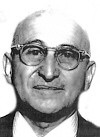Beno Gutenberg
| Beno Gutenberg | |
|---|---|
 |
|
| Born | June 4, 1889 Darmstadt, German Empire |
| Died |
January 25, 1960 (aged 70) Pasadena, California |
| Nationality | Germany |
| Fields | seismology |
| Institutions | California Institute of Technology |
| Alma mater | University of Göttingen |
| Doctoral advisor | Emil Wiechert |
| Notable awards | William Bowie Medal (1953) |
Beno Gutenberg (June 4, 1889 – January 25, 1960) was a German-American seismologist who made several important contributions to the science. He was a colleague and mentor of Charles Francis Richter at the California Institute of Technology and Richter's collaborator in developing the Richter magnitude scale for measuring an earthquake's magnitude.
Gutenberg was born in Darmstadt, Germany, and obtained his doctorate in physics from the University of Göttingen in 1911. His advisor was Emil Wiechert. During World War I, Gutenberg served in the German army as a meteorologist in support of gas warfare operations.
Gutenberg held positions at the University of Strasbourg, which he lost when Strasbourg became French in 1918. After some years during which he had to sustain himself with managing his father's soap factory, he obtained in 1926 a junior professorship at University of Frankfurt-am-Main, which was poorly paid.
Although he was already, in the 1920s, one of the leading seismologists worldwide and definitely the leading seismologist in Germany, he was still dependent on the position in his father's factory; however, he continued his research in his spare time.
In 1928, the attempt to become the successor of his academic teacher, Emil Wiechert, in Göttingen, failed. There are hints that Gutenberg's Jewish background might have played a role because, already in the 1920s, there were strong antisemitic tendencies in German universities. For similar reasons, he was also not accepted for a professorship in Potsdam to become the successor of Gustav Angenheister.
...
Wikipedia
